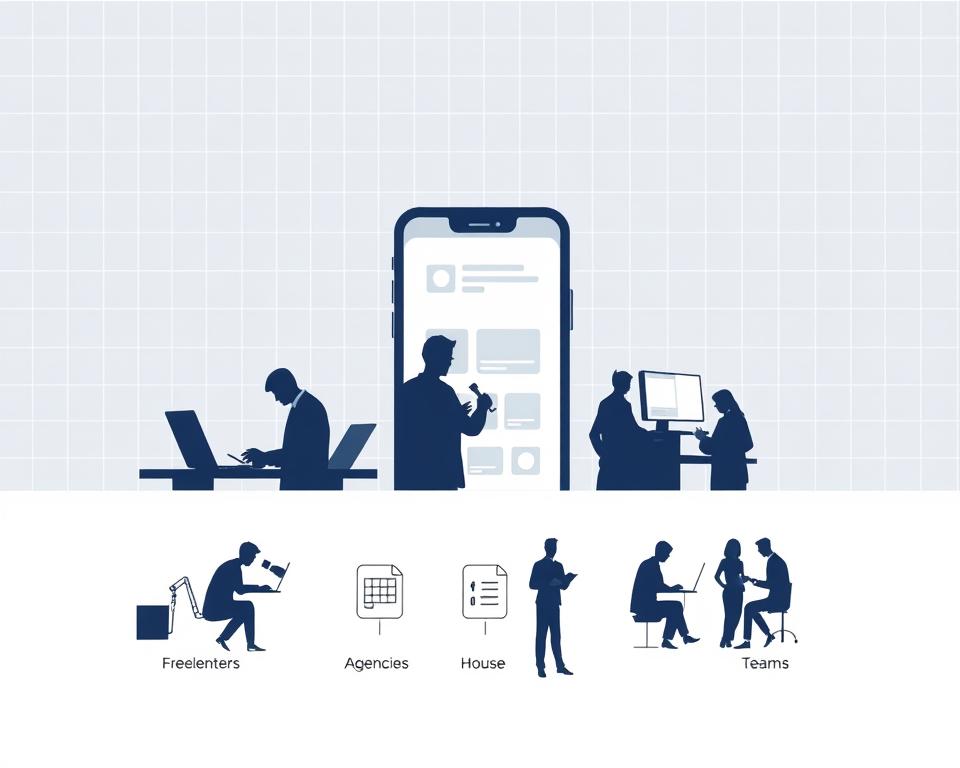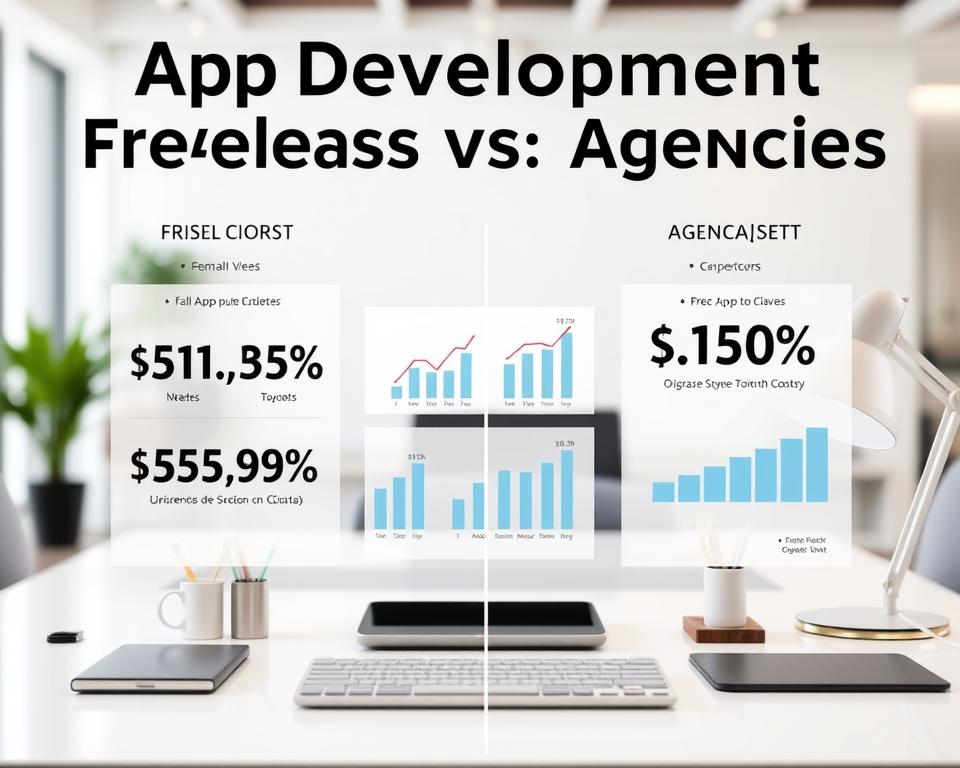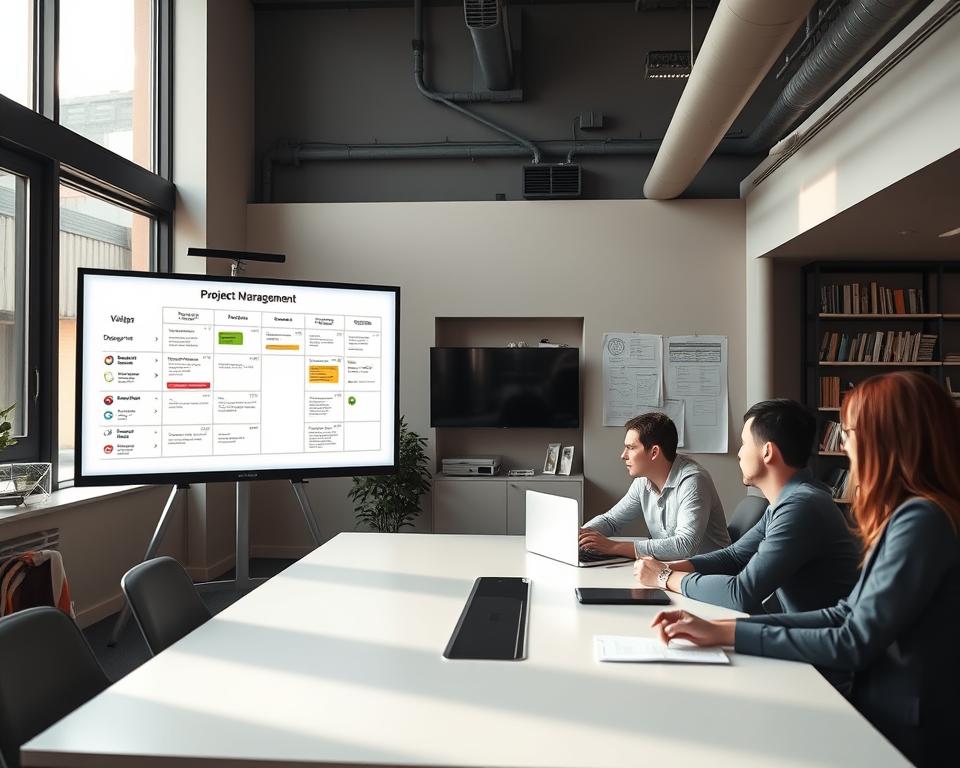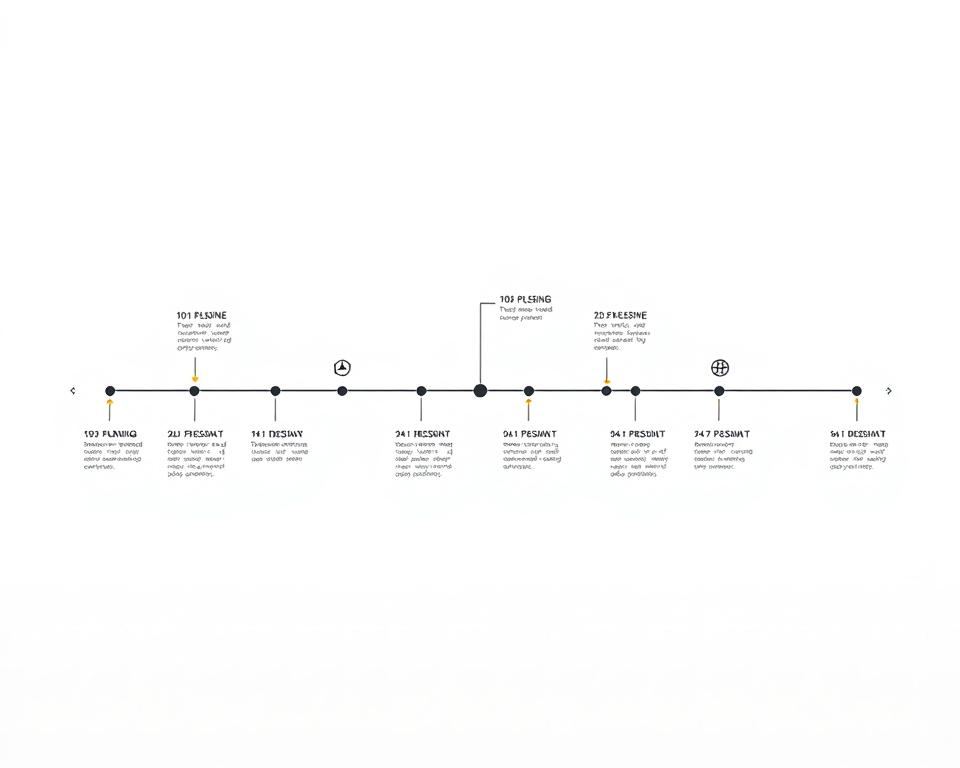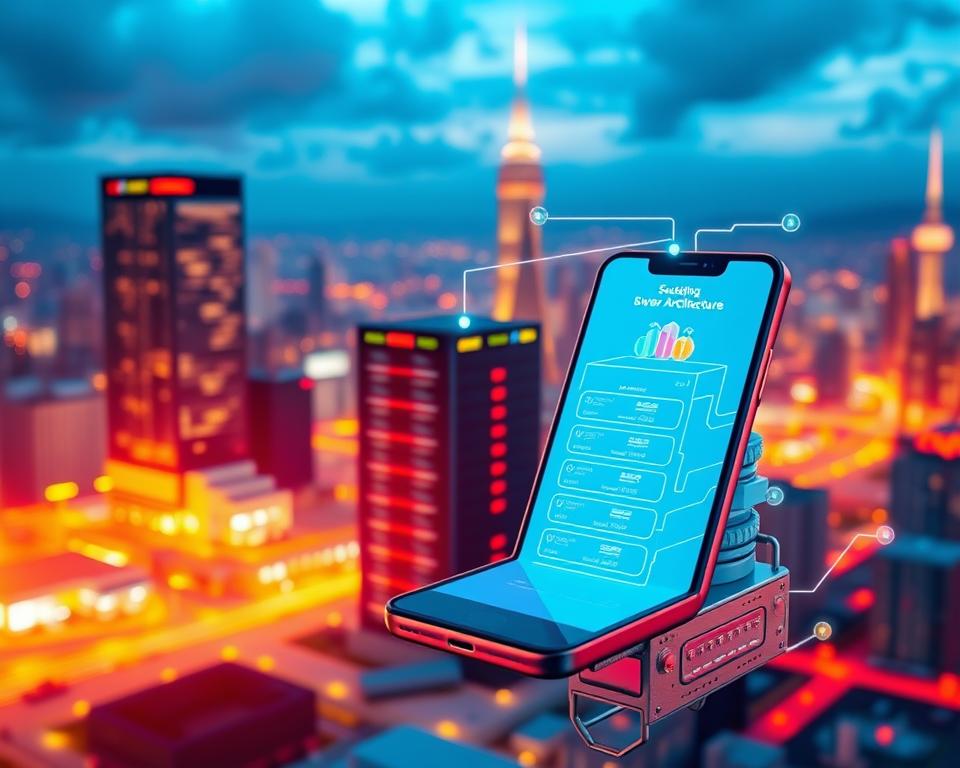Building a mobile app is a complex task. Choosing the right partner is key. You have two main options: hiring a freelancer or working with an agency that specializes in mobile app development.
Deciding between a freelancer and an agency depends on several factors. These include your budget, the project’s complexity, and your personal preferences. Knowing the differences between these options is crucial for making a good choice.
Table of Contents
Key Takeaways
- Consider your budget when deciding between a freelancer and an agency.
- Project complexity plays a significant role in choosing the right partner.
- Freelancers and agencies have different strengths and weaknesses.
- Your personal preferences can influence the decision-making process.
- Researching and comparing options is crucial.
Understanding Your App Development Options
Mobile apps are more popular than ever. Knowing your app development choices is key for businesses. You must think about the cost, whether to outsource or do it yourself, and pick the best app development companies.
The App Development Landscape Today
The app world is full of different players, from solo freelancers to big agencies. Each has its own good and bad points. Knowing these can help you make a smart choice. For example, looking at app development costs by can help with budgeting for outsourcing.
Key Stakeholders in App Development
App development involves developers, the companies that hire them, and the users. Good communication among these groups is vital for success. Knowing what each one expects can make the project run smoother.
Defining Your App Development Needs
Figuring out what you need for your app is crucial. You must look at your business needs, budget, and how fast you need it. This will help you decide if you should hire freelancers or work with app companies.
| Development Option | Cost | Complexity |
|---|---|---|
| Freelancers | Variable | Low to Medium |
| App Development Agencies | Generally Higher | Medium to High |
| In-house Development | High Initial Investment | High |
Freelancers vs Agencies: Who Should Build Your App?
Choosing between freelancers and agencies for app development is key. Knowing their strengths and weaknesses is essential.
Defining Freelancers in App Development
Freelancers are solo developers or small teams. They work on a project-by-project basis. They offer flexibility and can be cheaper for smaller tasks. When hiring freelancers for app development, you get a personal touch.
Working with freelancers has many benefits:
- They cost less than agencies
- You talk directly to the developer
- They’re flexible with project details and timelines
Understanding Development Agencies
App development companies, or agencies, focus on making apps. They have a team of experts for big, complex projects. Agencies offer a full solution with a clear plan.
Agencies bring:
- A team for all app development needs
- A clear project management process
- They can handle big or complex projects
The Hybrid Approach: Managed Freelancers
The hybrid approach uses managed freelancers. It balances freelancer flexibility with agency structure. This is great for projects needing special skills without a full agency.
Understanding freelancers, agencies, and the hybrid model helps you choose wisely. This ensures your app development needs are met.
Cost Considerations: Budget Impact Analysis
The cost of making an app can change a lot, depending on if you pick a freelancer or an agency. Knowing these costs is key to making a smart choice that fits your budget and needs.
Freelancer Pricing Models
Freelancers usually charge by the hour or for the whole project. Hourly rates can be from $25 to $100 or more, based on the developer’s skills and where they are. Project-based pricing is more set, with costs from a few thousand dollars for simple apps to $50,000 or more for complex ones.
Key factors influencing freelancer pricing include:
- Experience and skill level
- Project complexity
- Technology stack required
Agency Cost Structures
Agencies have clearer pricing models that include many services like development and upkeep. These models often have upfront costs and ongoing fees. Agency pricing is usually clear, showing costs for each part of the project.
Agency costs are influenced by:
- Size and reputation of the agency
- Scope of the project
- Level of expertise required
Hidden Costs to Consider
There are hidden costs to think about when making an app. These include costs for project management tools, communication, and possible delays.
ROI Expectations for Different Budgets
It’s important to know the return on investment (ROI) for your app project. With smaller budgets, making a minimum viable product (MVP) can test the market with less cost. Bigger budgets can handle more complex features and growth, leading to higher returns if the app does well.
To maximize ROI, consider:
- Defining clear project goals and success metrics
- Choosing the right development partner based on your budget
- Planning for post-launch maintenance and updates
By looking closely at your budget and understanding freelancer and agency costs, you can make a choice that supports your app goals well.
Quality and Expertise Comparison
The success of your app depends a lot on the quality and expertise of the developers. It’s important to know the skills and work quality of freelancers and agencies.
Skill Specialization: Generalists vs. Teams
Freelancers are often generalists with many skills. They can handle different parts of app development. Agencies, however, have specialized teams. Each team member focuses on specific areas like UI/UX design or backend development.
Portfolio Assessment Strategies
Looking at a developer’s portfolio is key to see their expertise in app development. Look for case studies or examples of their past work. These should show their ability to create high-quality apps.
Code Quality and Standards
Code quality is crucial for your app’s long-term success. Developers should follow industry standards and best practices.
Technology Stack Considerations
The technology stack choice affects your app’s performance and compatibility. Make sure your developers know the technologies needed for your project.
In conclusion, when choosing between freelancers and agencies, think about their skills, portfolio, code quality, and technology stack. This will help you make a better decision.
Vetting and Selection Process
Finding the right talent for your app project is key. This means checking both freelancers and agencies carefully. Each step in this process is vital for your project’s success.
Evaluating Freelancer Credentials
When looking at freelancers, check their portfolio first. Look for projects that are similar to yours. Also, read client reviews on sites like Upwork or Freelancer. A strong portfolio shows a freelancer’s skills and experience.
Next, interview or test their skills. This helps you see if they can meet your project’s needs. It’s important to understand their technical skills and problem-solving abilities.
Agency Selection Criteria
For agencies, look at more than just their portfolio. Check their team, expertise, and past successes. It’s important to know their development process and how they handle challenges.
Ask for case studies or references to see their work quality. An agency’s reputation and how long they’ve been in business also matter. These can show their reliability and expertise.
Red Flags to Watch For
Watch out for red flags like poor communication or unrealistic promises.
“A transparent and communicative development partner is crucial for the success of your project.”
Other warning signs include unclear contracts, bad testing, or no references. Being careful about these can prevent future problems.
Project Management and Oversight
The success of your app project depends on good project management. This is true for both freelancers and agencies. Good oversight means your project is done on time, within budget, and up to your standards.
Freelancer Management Requirements
Managing freelancers means you need to be hands-on. You must coordinate their workflow, set deadlines, and check their quality. Regular meetings and updates are key to keeping the project on track.
Using project management tools can make things easier. Tools like Trello, Asana, or Jira help organize tasks, track progress, and improve communication.
Agency Project Management Processes
Agencies usually have set project management processes. This gives more structure and predictability. They often use Agile methodologies, which allow for flexibility and ongoing improvement.
| Project Management Aspect | Freelancers | Agencies |
|---|---|---|
| Workflow Management | Client-managed | Agency-managed |
| Communication | Direct with the freelancer | Through an account manager |
| Flexibility | Can be more flexible | Structured with some flexibility |
Client Involvement Expectations
Your involvement greatly affects the project’s success. With freelancers, you’ll need to manage the project closely. Agencies handle the management but still value your input to ensure the project meets your needs.
Understanding these dynamics helps you make a choice that fits your project and management style.
Communication and Accessibility
Good communication is key to a successful app project. Whether you choose freelancers or an agency, clear communication is vital.
Working with Individual Developers
With freelancers, you must set up regular meetings and updates. Use video calls, emails, or project tools for this. Effective communication prevents mistakes and keeps the project moving.
Agency Communication Channels
Agencies have set communication systems. They have project managers, regular updates, and many ways to talk. This makes things more secure and reliable.
Time Zone and Availability Challenges
Time zone differences can affect how you talk, especially with developers from other places. Plan for when you can both work or adjust your schedule.
| Communication Aspect | Freelancers | Agencies |
|---|---|---|
| Initial Setup | Manual setup by client | Structured onboarding process |
| Regular Updates | Client-initiated check-ins | Regularly scheduled updates |
| Time Zone Challenges | Potential for delays | Often managed by agency |
Timeline and Delivery Expectations
Getting your app project done on time is key. Knowing the timeline and what to expect is important. This is true whether you choose a freelancer or an agency.
Realistic Timelines with Freelancers
Freelancers can be flexible with their time, which is good for urgent projects. But, they often work on many projects at once. Make sure to tell them your deadlines clearly to keep your project on schedule.
Working with freelancers means setting milestones and checking in often. This way, you can spot any delays early and fix them quickly.
Agency Delivery Schedules
Agencies have set schedules because they work in teams. They have a project manager to keep things on track. They also have more people to help with complex tasks.
Agencies are usually more reliable, with plans for unexpected delays. This makes it easier for clients to plan their app launches.
Handling Delays and Setbacks
Delays can happen even with the best planning. It’s important to have a plan for when things go wrong. Find out why the delay happened and talk to your team to get back on track.
As
“The greatest glory in living lies not in never falling, but in rising every time we fall.” – Nelson Mandela
, being ready for delays can help your project succeed. Having a backup plan and being flexible is crucial.
In summary, knowing your project’s timeline and what to expect is essential. By picking the right partner and having a solid plan, you can avoid problems and ensure a smooth app development process.
Scalability and Growth Potential
Scalability is key in app development. It shows if your project can grow with your business. As your app gets bigger, the solution you pick must handle more demands and users.
Scaling Projects with Freelancers
Freelancers are great for small tasks or parts of a big project. But, they might not be enough as your app grows. It’s hard to manage many freelancers and keep quality and communication steady.
Consider a managed freelancer model. This means a lead freelancer or manager oversees others. It helps keep things consistent and scalable.
Agency Capacity for Growth
Development agencies are built for big projects. They have established teams and ways to grow. Agencies can quickly add more people and skills as needed.
When picking an agency, check if they can grow with you. Look for ones that have handled big projects and have strong systems for growth. For more tips, visit Next Big Technology.
Future-Proofing Your App
Future-proofing means using practices and tech that will stay relevant. Choose a flexible tech stack and design for growth. Also, use strong development standards.
Both freelancers and agencies can help future-proof your app. But, agencies often have more expertise and access to new tech. They can guide you on building a scalable and adaptable app.
By focusing on scalability and growth, your app development will meet your long-term goals. This way, your app can grow and succeed in a competitive market.
Risk Management and Contingency Planning
Risk management in app development is more than just avoiding problems. It’s a forward-thinking approach to ensure success. Every app project has risks, and a good plan is key to handling them.
Freelancer Availability Risks
Working with freelancers comes with a big risk: their availability and commitment. Freelancers often handle many projects at once. This can cause them to focus less on your project, leading to delays.
To tackle this, it’s important to keep in touch well and set achievable goals. Industry experts say freelancers are valuable but their reliability can be a worry. A solid contract that outlines what’s expected and what happens if they don’t meet it can help manage these risks.
Agency Stability Factors
Agencies are usually more stable than freelancers. But, it’s still important to check their financial health, how happy their clients are, and how often they lose employees. A high turnover rate might show deeper problems that could affect your project.
Studies show that agencies with strong finances and happy clients usually do better. So, it’s crucial to do your homework.
Backup Plans and Exit Strategies
Whether you work with freelancers or an agency, having backup plans and exit strategies is vital. This means knowing the risks and having a plan to deal with them. For example, if a freelancer can’t make it, having a backup developer or an agency ready to step in can save your project.
For more tips on managing app development timelines, check out Next Big Technology. They offer great advice on planning and executing app projects.
Maintenance and Long-term Support
After your app goes live, keeping it running smoothly is key. It needs ongoing care to stay competitive. This requires a solid plan and action.
Post-Launch Support from Freelancers
Freelancers can help after launch, but they might not always be available. Make sure to talk about support terms before launch to avoid problems.
Key considerations when working with freelancers for post-launch support include:
- Reliability and response times
- Scope of work and fees
- Backup plans in case of unavailability
Agency Maintenance Packages
Development agencies offer detailed maintenance packages. These include ongoing support, updates, and development. They can be customized to fit your app’s needs, offering a solid support structure.
“A well-structured maintenance package can be the difference between an app that remains relevant and one that becomes obsolete,” says a top app development expert.
Ongoing Development Considerations
It’s important to plan for ongoing development. This means regular updates, using user feedback, and keeping up with new tech.
Knowing your options for maintenance and support helps you make smart choices. This ensures your app stays successful over time.
Legal Protections and Intellectual Property
Protecting your app’s idea and data is key. You need to know about legal protections and their impact on your project.
Contracts with Freelancers
Having a detailed contract with freelancers is crucial. It should cover the work, payment, and who owns what. Make sure it includes confidentiality and non-disclosure agreements to keep your app’s details safe.
A good contract helps avoid arguments and keeps everyone in sync. It’s wise to add how to solve problems and end the contract if needed.
Agency Agreements and Protections
Development agencies have standard agreements that cover important legal points. These agreements often offer better protection than freelancer contracts.
When working with an agency, read their agreement closely. Look for parts about who owns the app, keeping things secret, and who’s responsible.
| Aspect | Freelancer Contracts | Agency Agreements |
|---|---|---|
| Intellectual Property Rights | Often negotiated on a project basis | Typically included in standard agreements |
| Confidentiality | May require separate NDA | Usually covered under agency agreement |
| Liability | Can be limited by contract terms | Often distributed across the agency |
Intellectual Property Considerations
Intellectual property (IP) rights are crucial in app development. It’s important to keep ownership of your app’s IP.
Confidentiality and Security Measures
Keeping your app’s idea and data safe is essential. Use non-disclosure agreements (NDAs), secure data transfer, and limit access to sensitive info.
By understanding and using these legal protections, you can protect your app’s IP and ensure a smooth development process.
Real-World Case Studies
Looking at real-world app development can teach us a lot. We can see what works and what doesn’t. This helps us learn from others’ experiences.
Successful Freelancer App Projects
Freelancers have made many successful apps. For example, one freelancer made an successful e-commerce app that boosted sales by 30%. You can find more stories and lessons on MoldStud.
Agency Development Success Stories
Development agencies have also seen great success. For instance, Next Big Technology made an Android app that’s highly rated. Agencies like Next Big Technology have the skills and resources for big projects.
Lessons Learned from Failed Projects
Not every app project succeeds. But learning from failures is important. Common mistakes include bad project management, not enough testing, and too high expectations. By knowing these mistakes, developers can avoid them and do better.
In summary, studying app development case studies is very helpful. They show us what works and what doesn’t. By learning from these examples, developers can do better in their own projects.
Conclusion
Choosing between freelancers and agencies for your app depends on several things. These include how complex your project is, your budget, and what you prefer in project management and communication.
It’s important to know the good and bad of each choice. Freelancers are flexible and can save money, with rates from $10 to $75 an hour. Agencies, on the other hand, offer a full service for $50 to $250 an hour.
The return on investment (ROI) can vary a lot. Simple apps might see a 150-300% ROI with freelancers and 100-200% with agencies. But, more complex projects like enterprise or fintech apps could see returns up to 500-600% or 350-700% respectively.
In the end, picking the right partner for your project is all about understanding your needs. Weighing the pros and cons of freelancers and agencies will help you make a smart choice. This way, you can ensure your project’s success and get the best ROI.








